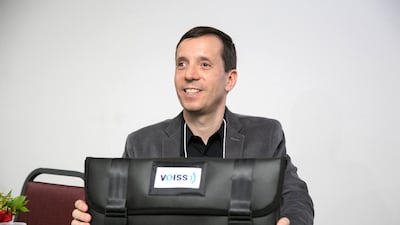A pioneering Brazilian entrepreneur has joined forces with Expo 2020 Dubai to drive forward ambitious plans for an affordable talking computer for the blind.
Forward-thinking Fernando Botelho is using technology as a tool to break down barriers and ensure the visually impaired community is not priced out of making progress.
Described as a “change maker” by Expo officials, who have provided key funding, Mr Botelho is excited by the prospect of making a difference to lives all over the world through his project, which will have an Arabic translation available.
He said many blind people are reliant on specialised e-readers or specially modified laptops with clunky software, which can set buyers back between $1,500 to $3,000.
The new computer, VOISS, pronounced voice, complete with a free Arabic language synthesiser, will go on sale from April 2020 at a fraction of the cost - between $200 to $250 - plus taxes and shipping costs.
"The Arabic version of our talking computer is currently under development. Right now it sounds robotic, but as we solve other technical challenges, we will make it sound more natural," Mr Botelho, VOISS founder, told The National.
“It includes software for all the usual activities such as editing texts, sending e-mails, exchanging instant messages, navigating the web, and using spreadsheets. It will soon also include audio editing software, so blind people can produce their own podcasts.”
The biggest challenge for the blind is knowing and keeping up with what is on the screen of a computer.
Working on the keyboard is easier once a person with visual impairments learns to type, they can negotiate the keys or a help mode reads aloud the name of each tab.
The ‘talking computer’ uses a speech synthesizer that converts in to audio all actions taking place on the screen whether data, documents or web content.
Tests begin next month to add the Arabic speech synthesiser to software in English, Portuguese and Spanish languages.
The computer recently become commercially available in Mr Botelho’s home country and is being used by 1,000 people following a soft launch last month.
The company will also provide the Arabic voice synthesiser free to download on Android phones, tablets, Linux and Windows computers and other devices to overcome obstacles to information faced by the blind.
The project received $100,000 funding from the Expo Live innovation programme that mentors initiatives with the potential of creating meaningful social impact.
“Thanks to Expo Live, people of determination all over the Arabic-speaking world will have a freely available voice which can be installed in all the major computing platforms,” said the 49-year-old.
“During Expo 2020 Dubai, we will establish partnerships to expand the languages available on our talking computer.”
“Funding support we received from Expo Live has allowed our team to recruit software and linguistics experts essential for the development,” he said.
“Developing artificial voices is a complex process, involving experts from many fields, and thanks to the expo, we have brought together a team which includes persons with determination from many countries.”
Yousuf Caires, Expo Live vice president, hailed the efforts of Mr Botelho.
“His work is a great inspiration and the aim to produce the first free Arabic language speech synthesiser for low-cost devices will make a big impact in the region,” he said.
“It’s crucial that technology benefits people of determination and helps them to play full roles in society. We are fortunate to have these projects as part of our programme bringing change to those who need it."
Mr Botelho’s long term goal is to ensure affordable and high quality technology is made available to blind people in developing countries.
“We are developing videos which explain how to assemble a VOISS computer for those who cannot afford to buy even our most affordable device,” he said.
“Our first video is still only available in Portuguese, but we will have translations soon. The fun part is seeing blind people assembling their own talking computers.”
He has been working for more than a decade on building software packages for the blind.
In a project initially called F123, he created an entire operating system on a pen drive and worked on the technology via web browsers to improve access.
During tests, the team found it was not easy to install the disc or pen drive and the developers moved to a pre-installed VOISS computer.
Expo support has been critical for technical development, testing and to market the technology to a global audience.
The project has been a huge learning experience for Emirati Marwah Al Yammahi, an associate with Expo Live who has limited vision.
From providing Arabic translation, she has become a key contributor identifying linguistics experts, highlighting problems with the computer prototype, selecting top-quality recording studios for voice recordings and volunteers to contribute their voices.
“We are working together to create the Arabic version that is a user-friendly version,” said Ms Al Yammahi who travels to the Dubai expo office from Fujairah to work on the project.
“I am excited that the whole community will benefit from this.”


